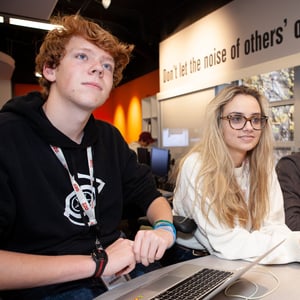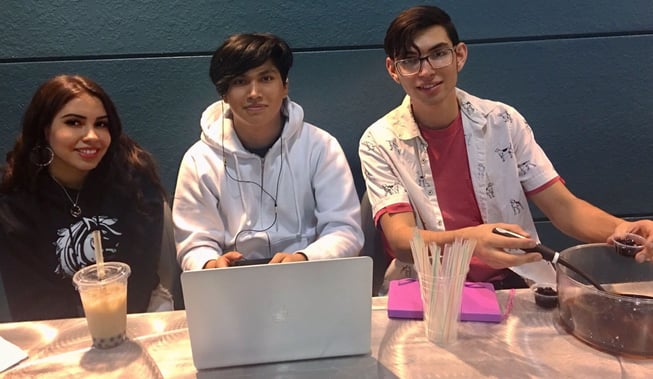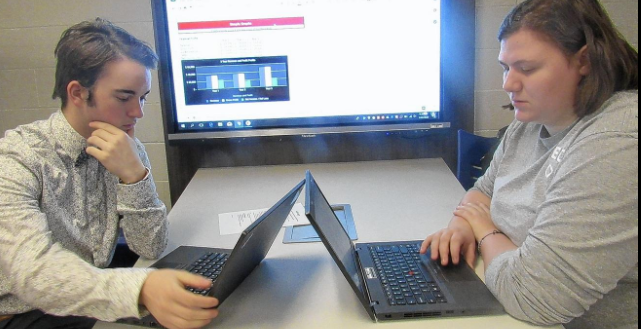When it comes to gaining funding and support for Career and Technical Education (CTE) in high schools, few know the drill better than lifelong educator, Amy Schakat.
Amy Schakat is a CTE advocate with more than 20 years of experience working in education. She’s held intervention and special education roles as well as added more than 17 different tech programs to her impressive roster. About eight years ago, she was given the opportunity to work for the South-Western City School District in central Ohio as Director of Career and Technical Education.
Career and Technical Education (CTE) in High School
.jpg?width=202&name=amy.schakat%20(2).jpg) When she first arrived, Schakat started looking at what South-Western City students were learning in their classrooms, labs, and various activities. A few things stood out.
When she first arrived, Schakat started looking at what South-Western City students were learning in their classrooms, labs, and various activities. A few things stood out.
“When I first arrived, we had a marketing program at our schools that ran a store. The teachers were working very hard in the store managing student work. When I looked at the curriculum, when I looked at the work the students were doing … I felt they really weren’t learning at a high level but focused on products and sales tasks.”
In other words, students weren’t quite gaining the technical skills needed to succeed in the workforce after high school, as Schakat thought they should. Instead of handling sales reports, taxes, and vendor relationships, students were focused on completing tasks of selling items within the store. Then, Schakat looked at student engagement.
“I looked at our overall outcomes, our technical skill attainment, and benchmarks for all of our programs” she shares. “For this particular program, I didn’t feel like the curriculum aligned with what I believed the students could do, or with what the world is like out there.” In Ohio, for example, the economy is rich with innovative companies ranging from manufacturing to automobiles to healthcare, and students need to be prepared to take on these jobs once they’ve graduated high school.
“Innovation and entrepreneurship don’t occur just in a business class or with a business major,” Schakat says. “Innovation can and should occur in any field, in any industry. When I came to South-Western City Schools, I had the opportunity to connect with a variety of industries—insurance, healthcare, manufacturing—all which look for the employee with an innovative, entrepreneurial mindset."
“Innovation can and should occur in any field, in any industry."
~ Amy Schakat
Schakat could see clearly that students needed to be engaged at a higher level, so she attended the Association of Career and Technical Education (ACTE) National Conference in Nashville, where she learned about Uncharted Learning.
It Starts With an Idea
At the conference, Schakat learned the story of a successful student startup born from entrepreneurship education in the Chicago suburbs. “Students identified a problem. They are so passionate about this problem that they were getting up at 4:30 in the morning, driving around the cold streets of a Chicago suburb, to create a bus app that would notify families when the school bus was coming, because they didn’t want students standing out in the cold for a long period of time,” Schakat says.
“The students, on their own, contacted the bus garage and got the bus routes, identified families that would participate in their market research, got their numbers, and sent texts to families saying: Hey, the bus is 10 minutes out.” Schakat remembers thinking students in Chicago are no different from students in Ohio.

“Students want to be engaged in their education. They want to be motivated and they want to learn,” she says. “And they have some amazing ideas, but we have to believe that they will get up at 4:30 in the morning and chase a dream or a passion because they see there’s a problem and they believe they can solve it.”
Bringing CTE to Life through Entrepreneurship
When it comes down to it, students really want to be in charge of solving a problem for the good of others. That’s the mindset Schakat took with her as she set her sights on revamping the South-Western City School District’s CTE Entrepreneurship course.
“We were focused on the tools, like Microsoft Office, that students might use—rather than the business concepts, principles, and entrepreneurial way of thinking,” she says. “So I embarked on a three-year process to shift mindsets of staff, students, administrators, and the district to realize no matter what you do, no matter where you go, employers want to hire people who are innovative and have an entrepreneurial mindset.”
"No matter what you do, no matter where you go, employers want to hire people who are innovative & have an entrepreneurial mindset."
~ Amy Schakat
Although the course didn’t always run smoothly, Schakat’s colleagues embraced the transition. “It hasn’t been easy for them, because in general school is about a right answer and a wrong answer,” she says. “The INCubatoredu curriculum is not about a right or wrong answer. It’s more about trying, failing, and thinking. That’s really my focus in this course. And I believe every student should take the course,” she adds.
"I believe every student should take the course."
~ Amy Schakat
Shifting Mindsets
Over time, Schakat and her colleagues shifted from their previous marketing pathway to the business pathway outlined by Uncharted Learning. Staff at South-Western City Schools trained with Uncharted Learning, one-on-one and at our global Summit, to expand their focus in hopes of helping students expand theirs.
“Uncharted Learning has been a great resource for me as an Administrator to bounce ideas off of and collaborate with,” Schakat says. But aside from just shifting the mindsets of students and staff, Schakat’s team is also tasked with building hard, soft, and technical skills—or what she refers to as “professional skills.”

Teaching Professional Skills
One of the most valuable professional skills Schakat believes students learn from INCubatoredu is perseverance. In today’s unpredictable world, we know things don’t always play out how we intended. “You have to figure out how you can collaborate, work together, and come out on the other end,” Schakat says, adding collaboration to her list. “Communication is part of that collaboration.”
She also emphasizes time management. “In this program, there is no bell, because there are no bells in life, really,” Schakat says. “Your boss might say, ‘Hey, I need this by noon on Friday,’ but what she doesn’t say to you is, ‘On Thursday night at eight, you need to do this. And from nine to ten, you need to do that. Time management is another professional skill that I really believe this curriculum supports.”
There’s no question whether CTE in high schools supports professional skill building. But while the benefits of engaging high school students in career and technical education sooner are vast, with them comes a price tag. Perkins grants can help.

Perkins CTE Grants for High School
In 2006, the Carl D. Perkins Career and Technical Education Act was passed, providing a path for funding in support of early career and technical education. These grants give both students and educators the freedom to dive into CTE at full speed. They also grant students the opportunity to earn credentials for their studies.
When it comes to career and technical education grants, there is both a curricular process and a financial process. “I always start with the curriculum and what students need,” Schakat says. “In our district, we rolled out a strategic entrepreneurship course and the curriculum of that course aligned with INCubatoredu. That’s the first process. Then comes the question: How are we going to pay for that?”
Schakat was excited to discover that with INCubatoredu, she didn’t have to worry about purchasing textbooks. “The resource materials are embedded into the curriculum and the training is embedded into the curriculum,” she shares. “The INCubatoredu package includes your curricular resource materials and supports your professional development. There are options under Perkins to cover this, but in our district, we use Perkins funding for staff support, rather than equipment.”
Perkins Funding for Staff Development, Training & Engagement
.png?width=230&name=prof%20dev%20(3).png)
“I believe it’s absolutely critical for anyone taking advantage of this resource to spend time with your staff through staff development, staff training, and staff engagement, because the training the folks at Uncharted learning provide is second to none.”
“It’s less than the cost of textbooks,” Schakat adds. “It’s less than the cost of a virtual resource. Unlike a static textbook, the INCubatoredu curriculum changes when Uncharted Learning learns something new or feels there needs to be more emphasis on a certain topic. You’re constantly interfacing with an updated resource.”
"The training Uncharted Learning provides is second to none."
~ Amy Schakat
Schakat recently had the opportunity to send her school’s Mobile App Development teacher, Derek Fitzer, to our MobileMakersEDU training in Chicago. He came back and shared, “Amy, this is the best professional development I’ve had in 23 years. I feel energized. I’m so excited. I’m so engaged. I can’t wait to teach my students.”
He ended up being the Ohio ACTE 2020 Teacher of the Year. “I attribute a lot of that to the professional development he received and his excitement to support this,” says Schakat. “That’s a huge benefit to partnering with Uncharted Learning.”
Be Patient & Persevere
From partnering with the right professionals and understanding the curriculum to gaining community support and securing funding, implementing a successful entrepreneurship program in your district or CTE high school is a journey. And as the last year has taught us more than ever, the journey is not always easy and it’s not always short.
“It’s not just about a curriculum and a PowerPoint. If you’re looking for something you can send off to someone and say, ‘Do these 10 things and you’ll be good,’ that’s not what this is about,” Schakat says. Instead, the INCubatoredu entrepreneurship curriculum is about conversation, collaboration, starting, failing, starting again, failing again, and restructuring. “It’s a way of thinking and it’s a belief system.”
“If you’re going to embark on this journey, you really need to believe that this is best for students and teachers,” Schakat says. “You really, truly have to embrace it yourself, be passionate about it, and keep pushing forward.”
